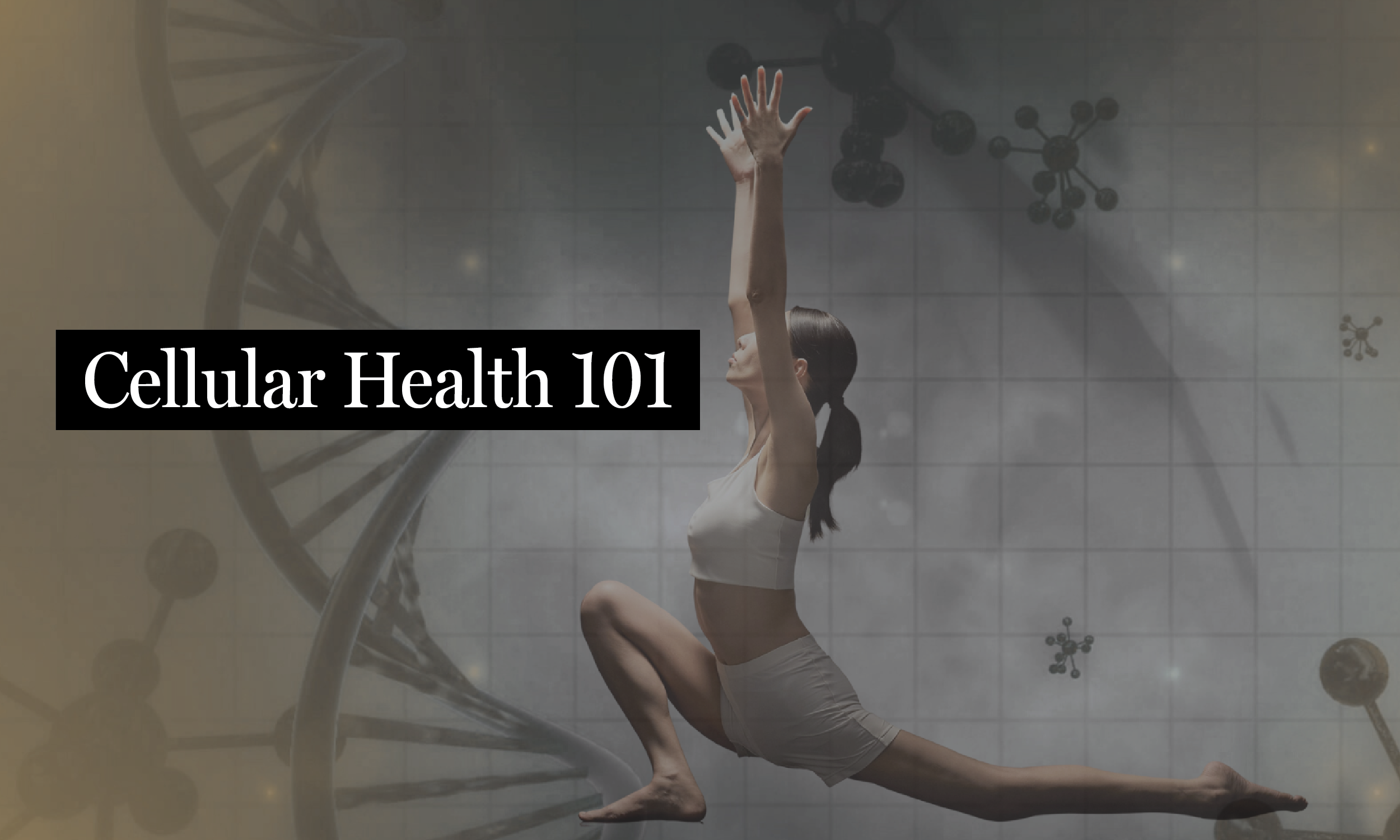
Our bodies are made up of roughly 30 trillion cells, each working together to keep this incredible machine — YOU — running smoothly. Ultimately, your health comes down to how well each individual cell performs its role. But what exactly is cellular health, and why is it so crucial?
What is Cellular Health?
Cellular health refers to the optimal functioning of cells, the basic building blocks of life. Healthy cells produce energy, synthesize proteins, remove waste, and communicate effectively with one another. When cells function properly, tissues, organs, and systems operate efficiently, keeping the body in balance.
Cellular health is not static. It is influenced by genetics, lifestyle, environmental exposures, and aging. Over time, cells undergo changes that can impair their function, increasing the risk of disease and contributing to the aging process.

Why is Cellular Health Important?
Healthy cells mean a healthy you. The health of your cells directly determines your overall vitality, resilience, and longevity. When cells function optimally, they repair damage, fight infections, produce energy, and keep every system in balance, powering every heartbeat, thought, and movement.
However, with age, stress, and poor lifestyle habits, cellular function can decline. Sluggish or damaged cells lead to fatigue, slower recovery, chronic disease, and accelerated aging. Supporting cellular health is the foundation of lasting health and longevity.
The Role of Cellular Health in Aging
Aging is driven by interconnected biological mechanisms known as the hallmarks of aging (check out our blog series on how spermidine helps combat each of the 12 hallmarks).
Every sign of aging, from lower energy to weaker immunity, begins at the cellular level. Maintaining cellular health can help slow aging and extend healthspan (the period of life spent in good health). That’s why longevity science focuses on supporting cellular renewal through sleep, movement, balanced nutrition, and natural compounds like spermidine, which helps trigger autophagy, the body’s natural cellular cleanup process. When your cells are young and resilient, you are too.
Core Pillars of Cellular Health
Cellular health relies on multiple interconnected mechanisms that ensure proper function, resilience, and homeostasis:
- Genomic stability – Maintaining DNA integrity through repair mechanisms, telomere preservation, and chromatin organization to prevent mutations and disease.
- Proteostasis – Balancing protein synthesis, folding, trafficking, and degradation to prevent misfolding and aggregation.
- Mitochondrial function – Ensuring efficient energy production, redox balance, and metabolic signaling. Dysfunction accelerates aging and disease.
- Autophagy & organelle quality control – Recycling damaged components and organelles (e.g., mitophagy) to maintain cellular cleanliness and prevent toxic accumulation.
- Nutrient sensing & metabolic regulation – Pathways like mTOR, AMPK, and sirtuins allow cells to respond to energy and nutrient levels; dysregulation leads to metabolic disorders.
- Cellular communication – Coordinating tissue function via hormones, cytokines, growth factors, and extracellular vesicles. Disruption can trigger chronic inflammation (“inflammaging”).
- Stem cell function & regeneration – Supporting tissue repair and renewal; stem cell exhaustion contributes to age-related decline.
- Inflammation control – Maintaining balanced immune responses; chronic low-grade inflammation damages cells and tissues.
- Epigenetic regulation – Controlling gene expression through DNA methylation, histone modifications, and chromatin remodeling; dysregulation drives aging and disease.
- Cellular senescence – Preventing accumulation of senescent cells, which secrete pro-inflammatory factors that impair tissue function.
- Redox balance & stress response – Managing reactive oxygen species via antioxidant systems and stress response pathways to prevent cellular damage.
- Membrane integrity – Preserving plasma and organelle membranes to support barrier function, signaling, transport, and overall cellular homeostasis.
How Can We Support Cellular Health?
Promoting cellular health involves adopting lifestyle and dietary practices that enhance the functioning of cells. Here are some actionable strategies:
- Balanced nutrition: Consuming a diet rich in antioxidants, vitamins, and minerals can protect cells from oxidative stress and support their functions. Foods high in polyamines, such as spermidine, have been shown to promote autophagy, improve mitochondrial function, reduce oxidative stress and improve overall cellular health.
- Regular exercise: Physical activity enhances mitochondrial function and supports cellular energy production. Exercise also reduces inflammation and improves nutrient sensing.
- Adequate sleep: Sleep is essential for cellular repair and regeneration. It helps maintain the body's circadian rhythms, which are crucial for cellular health.
- Stress management: Chronic stress can negatively impact cellular health by increasing inflammation and oxidative stress. Practices such as meditation and mindfulness can help mitigate these effects.
- Avoiding hazardous substances: Limiting exposure to harmful chemicals and pollutants can prevent cellular damage.
- Caloric restriction and fasting: Intermittent fasting and caloric restriction enhance autophagy, mitochondrial function, and longevity. These effects can also be supported by caloric restriction mimetics like spermidine. While not necessary with a balanced diet, these approaches can provide extra cellular support.
Conclusion: Your Cells, Your Lifelong Ally
Your cells are the foundation of everything you are: your energy, resilience, and vitality all start at the cellular level. Supporting them isn’t just about living longer; it’s about living better. Through balanced nutrition, movement, quality sleep, stress management, and targeted interventions like spermidine, you give your body the tools to repair, renew, and perform at its best.
Small cellular changes lead to big results. When your cells are healthy, you recover faster, think clearer, and age more gracefully. Start supporting your cells now, and your future self will thank you!







